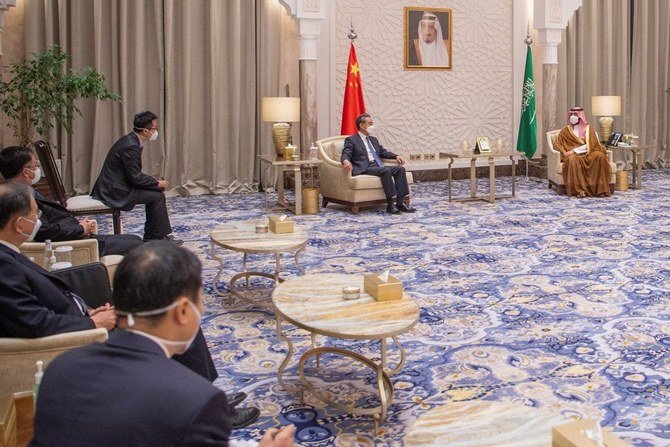
- ARAB NEWS
- 25 Apr 2024

Chinese Foreign Minister Wang Yi paid an official visit to Saudi Arabia on Wednesday. The visit, which came against the background of the current coronavirus disease epidemic, saw the leaderships of the two countries have face-to-face exchanges, highlighting the importance China attaches to the development of its comprehensive strategic partnership with Saudi Arabia.
During the visit, Wang met with Crown Prince Mohammed bin Salman and Foreign Minister Prince Faisal bin Farhan. They exchanged views on China-Saudi relations, cooperation in various fields, and issues of common concern. During the visit, China and Saudi Arabia reached important consensus on the following issues.
First is the continuous deepening of strategic mutual trust between the two countries. Under the personal guidance of the two leaderships of state, China-Saudi relations have always maintained a momentum of robust development. The two countries share weal and woe and have cooperated in fighting the epidemic, setting a model for cooperation between nations. As China’s comprehensive strategic relationship partner, developing relations with Saudi Arabia is the priority direction of China’s Middle East policy. In the face of big changes unseen in a century and the new situation in the Middle East, the long-standing and increasingly strong China-Saudi Arabia relationship has become more strategic.
China supports Saudi Arabia in safeguarding its national sovereignty, security and stability, taking a development path that suits its own national conditions, and playing a greater role in international and regional affairs, while opposing interference in the Kingdom’s internal affairs under the pretext of so-called ideology and values.
The second is to work together to maintain security and stability in the Middle East. During the visit, Wang proposed a five-point initiative to achieve peace and stability in the Middle East, calling on countries in the region to respect each other, uphold equity and justice, achieve nuclear non-proliferation, jointly foster collective security, and accelerate development cooperation. China is willing to play its due role in promoting long-term peace and stability in the Middle East.
At the same time, Wang appreciated Saudi Arabia’s important role in regional peace and stability, and supported its initiative to resolve the Yemen issue. The security and stability of the Middle East has a far-reaching overall impact. China has no private interests in the region and is committed to developing relations with its countries. It is willing to work with all parties to play a greater role in maintaining regional security and stability and promoting regional development.
The third is to enhance practical cooperation in various fields while facing new and important opportunities. China has entered a new stage of development and has issued the “14th Five-Year Plan” and 2035 long-term goals. It is committed to achieving high-quality development in this new era. China is willing to strengthen the Belt and Road Initiative and Saudi Arabia’s Vision 2030, making good use of the high-level joint committee mechanism of the two countries and promoting traditional cooperation in trade, investment and major projects, as well as in emerging fields such as artificial intelligence and big data. China is willing to actively participate in the economic diversification of Saudi Arabia and jointly realize sustainable development.
The fourth is to jointly uphold a fair and just international order. Every country has the right to choose its own development path and should be committed to serving its people. The principle of noninterference in internal affairs is a clear principle in international law. The two countries will further strengthen unity and cooperation, maintain the international system with the UN as the core and the international order based on international law, and safeguard the common interests of developing countries.
The two countries’ long-standing and increasingly strong relationship has become more strategic.
Chen Weiqing
I also want to emphasize that this year marks the 40th anniversary of the founding of the Gulf Cooperation Council (GCC), meaning it is also 40 years of China and the GCC moving forward hand in hand. During this week’s visit, Wang also met with GCC Secretary-General Dr. Nayef Al-Hajraf. Standing at a new historical starting point, China is willing to discuss with the GCC member countries how to raise the level of China-GCC relations, firmly safeguard the sovereignty of each country, and deepen mutually beneficial cooperation in various fields. It is hoped that the two sides will complete negotiations on the China-GCC free trade agreement as soon as possible, jointly overcome the downward pressure on the global economy, and realize economic recovery. China is willing to continue to strengthen anti-epidemic cooperation to help build a healthy community.